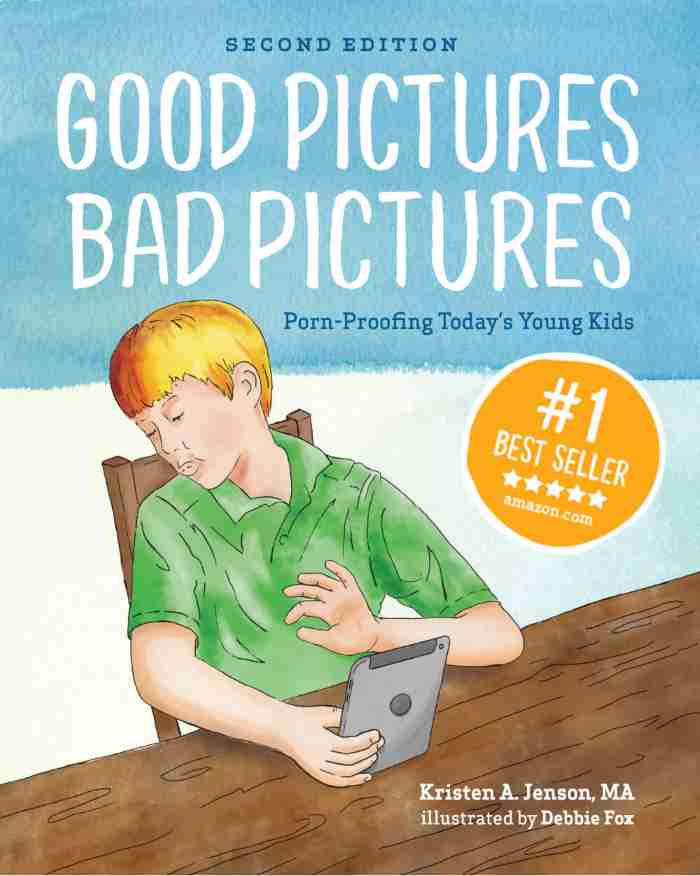

5 Back to School Tips for Porn-Immune Kids
A parent's nightmare
An innocent kindergartner gets on a school bus to ride home. A third-grader approaches her, holds up a smartphone and says, “Look at this!” What the little girl sees is hard core porn. This story came from a middle class neighborhood in Boise, Idaho, but it can happen anywhere.
How does this little girl react? Will she tell her parents? Will she be scarred for life? Much of that depends on what she’s been taught and how well she’s been prepared.

Back to school time is exciting for kids and parents. New teachers, new friends, new notebooks! A new beginning. But let’s not kid ourselves about the risks. As mobile devices flourish, the risk skyrockets for young kids to be exposed to Internet pornography.
Here’s what you can do.

1. Define pornography—don’t assume kids know what it is
I know this sounds basic, but even if kids hear the word pornography, they probably don’t know what it means unless you define it for them.
Jill Manning, PhD, in her book What’s the Big Deal About Pornography? (p. 1-2), relates the experience of a dad who took his 13-year-old son to a presentation about the effects of pornography. On the drive home, his son turned to him and asked, “So what is pornography, anyway?” Even after an hour-long presentation, even after being exposed to it while doing homework, this boy had not make the connection. Dr. Manning advises:
“Being clear on what pornography is and how to recognize it is the first step to protecting ourselves.”
Want some help on defining pornography for young kids? Check out How to Define Pornography for a Seven-Year Old.
2. Ask your kids to tell you if they ever see it
For whatever reason, kids often don’t tell their parents when they’ve been exposed to pornography.
Jill Manning, PhD, tells about her own unsettling exposure to a centerfold while playing at a friend’s home when she was eight. She immediately called her mom and asked to come home, but never told a soul.
“When I consider the kinds of images young people today encounter upon their first exposure to pornography, I shudder to think what would have happened to me if I had seen something more graphic…A pornography problem often starts with an innocent curiosity about something seen or heard—and then it can quickly lead to a twisted appetite for more graphic and harmful images.” (What’s the Big Deal about Pornography?, pp. 12-13)
For more ideas on getting your kids to tell you when they've been exposed to porn, check out 3 Reasons Kids Keep (Dangerous) Secrets.

3. After school, ask your kids what they've seen or been shown on the Internet that day
No nagging. Just bring it up in conversation. You might even share something you've seen or heard about online. This is all about teaching accountability.
“Hey, I saw the most amazing dance video on Facebook today. Aunt Vicki shared it with me. You’ll have to see it! What did you see online today?”
[[CTA]]
4. Password protect all of your mobile devices, install filters for the Wi-Fi in your home
I can’t tell you how many stories I’ve heard of young kids accessing porn from the family iPad or a parent’s iPhone. But it’s totally understandable! Kids grow up fast and the need to put a password on devices just sneaks up on you!
Recently, an article in the Deseret News National told the story of on an eight-year-old girl who was viewing hard core porn videos with her friend in her playroom closet. Once her parents found out (from the friend’s mother who called and told them what had been going on), the dad immediately password protected that iPad!
Go a step further and make sure your kids’ friends don’t bring it in on their devices. Install a filter that works on the level of your router to block inappropriate content no matter whose device is trying to access it. This article has some good information to get you started.
5. Confiscate (temporarily) all mobile devices when kids come over to play
Kids don’t need personal mobile devices to play in my humble yet correct opinion. Some parents make a rule that all incoming friends drop their mobile phones in a basket on the kitchen counter.
My neighbor’s son just had a birthday and his parents allowed a few select friends to come over for a sleepover. (Disclaimer: I don’t recommend sleepovers.) These boys wanted to sleep out in their very cool playhouse and when they were settled, dad came out and said, with a smile on his face, “If I find any electronics on any of you, you are going home immediately.” A Kindle was quickly handed over! And guess what, they all still had a great time!
This is all part of tech etiquette. Read more here about establishing your own family’s rules.
It's truly sad that we have to work so hard to protect our kids. But this is the silver lining: As we talk to our kids, check in with them and empower them, we actually get closer and form a more trusting relationship. United we stand, divided we fall. Nothing is more true than this when dealing with the invasion of pornography.
Do you have friends or family who could use some help porn-proofing their kids?
Let them know about Protect Young Minds!



Good Pictures Bad Pictures
"I really like the no-shame approach the author takes. It's so much more than just 'don't watch or look at porn.' It gave my children a real understanding about the brain and its natural response to pornography, how it can affect you if you look at it, and how to be prepared when you do come across it (since, let's face it... it's gonna happen at some point)." -Amazon Review by D.O.








